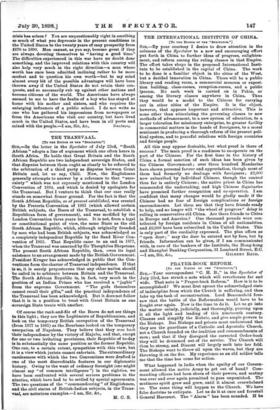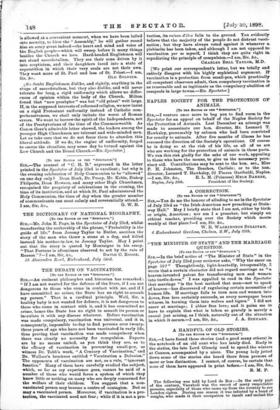PRAYER-BOOK REFORM.
[To TRY EDITOR OF THE "SPECTATOR."] SIR,—Your correspondent " C. H. B.," in the Spectator cif July 23rd, has struck a note which will reverberate far ana wide. That note is " Prayer-book Reform." How is it to be accomplished? We must first uproot the acknowledged state of indiscipline from which the Church is suffering, and then take up the task of reconstruction. Lord Beaconsfield fore- saw that the battle of the Reformation would have to be fought over again. Now is the time to do it. Let us go into the matter calmly, judicially, and thoroughly, pouring upon it all the light and leading of this nineteenth century. Cleanse and simplify the Rubric, and give ample powers to the Bishops. Bat Bishops and priests must understand that they are the guardians of a Catholic and Apostolic Church, not a Church founded on the tradition and commandments of men ; and that if they disregard the corrected Order-book they will be drummed out of the service. The Church will then be strong, and Dissent will largely melt into her fold. The Bishops want to throw oil upon the waves, but they are throwing it on the fire. My experience as an old soldier tells me that the time has come for action.
What happened in India when the apathy of our Govern- ment allowed the native Army to get out of hand? Com- manding officers bad been shorn of their powers, and mutiny was over and over again permitted to pass unpunished. The mutinous spirit grew and grew, until it almost overwhelmed us. The same thing will happen to the Church. We have false doctrine to extirpate. Let us do it at once and forestall General Harcourt. The " Alarm " has been sounded. If he is allowed at a convenient moment, when we have been balled into security, to blow the "Assembly," he will gather round him an army great indeed—the heart and mind and voice of the English people—which will sweep before it many things besides the Church we love. Hard-headed Englishmen will not stand sacerdotalism. They see their sons driven by it into scepticism, and their daughters lured into a state of superstition in which their very souls are not their own. They want more of St. Paul and less of St. Priest.—I am,
1No doubt Englishmen dislike, and rightly, anything in the shape of sacerdotalism, but they also dislike, and will never tolerate for long, a rigid uniformity which allows no differ- ences of opinion within the body of the Church. Milton found that "new presbyter" was but "old priest" writ large. If, in the supposed interests of reformed religion, we now insist on a rigid Protestant uniformity instead of Catholic com- prehensiveness, we shall only imitate the worst of Roman errors. We want to borrow the spirit of the Independents, not of the Presbyterians of the time of the Commonwealth. As Canon Gore's admirable letter showed, the leaders among the younger High Churchmen are tolerant and wide-minded men. Let us take care that we do not force them to abandon this liberal attitude. If we do, the engine of uniformity, forged to coerce the ritualists, may some day be turned against the Low Church and the Broad Church.—ED. Spectator.]



































 Previous page
Previous page